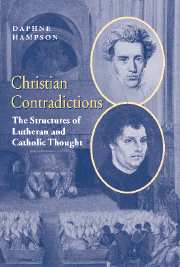Crossref Citations
This Book has been
cited by the following publications. This list is generated based on data provided by Crossref.
Sagovsky, Nicholas
2004.
Christian Contradictions? Hampson, Jüngel and Lane on Justification and the Structures of Lutheran and Catholic Thought.
International Journal for the Study of the Christian Church,
Vol. 4,
Issue. 1,
p.
91.
Hemming, Laurence Paul
2005.
A Contradiction: The Structure of Christian Thought.
New Blackfriars,
Vol. 86,
Issue. 1001,
p.
3.
Legrand, Hervé
2006.
Herméneutique et vérité. Des énoncés dogmatiques en contexte œcuménique.
Recherches de Science Religieuse,
Vol. Tome 94,
Issue. 1,
p.
53.
2008.
Love.
p.
172.
Carroll, Anthony J.
2009.
The Importance of Protestantism in Max Weber's Theory of Secularisation.
European Journal of Sociology,
Vol. 50,
Issue. 1,
p.
61.
Matlock, R. Barry
2011.
Zeal for Paul but Not According to Knowledge: Douglas Campbell’s War on ‘Justification Theory’.
Journal for the Study of the New Testament,
Vol. 34,
Issue. 2,
p.
115.
2012.
Beyond Calvin.
p.
385.
Fesko, J. V.
2017.
Aquinas Among the Protestants.
p.
249.
Carroll, Anthony J.
2018.
Luther, Loyola and La La Land.
New Blackfriars,
Vol. 99,
Issue. 1080,
p.
163.
2019.
Biblical Scholarship in Louvain in the ‘Golden’ Sixteenth Century.
p.
265.
Vestrucci, Andrea
2019.
Metalanguage and Revelation: Rethinking Theology’s Language and Relevance.
Logica Universalis,
Vol. 13,
Issue. 4,
p.
551.
2019.
Renovatio.
p.
317.
Stern, Robert
2020.
How Is Love of the Neighbour Possible? A Løgstrupian Response to a Lutheran Critique of Levinas—and Vice Versa.
The Monist,
Vol. 103,
Issue. 1,
p.
83.
Linebaugh, Jonathan A.
2020.
‘The Speech of the Dead’: Identifying the No Longer and Now Living ‘I’ of Galatians 2.20.
New Testament Studies,
Vol. 66,
Issue. 1,
p.
87.
Gaetano, Matthew T.
2020.
A ‘Chief Error’ of Protestant Soteriology: Sin in the Justified and Early Modern Catholic Theology.
Perichoresis,
Vol. 18,
Issue. 6,
p.
41.
Simuț, Corneliu C.
2022.
Spiritual Formation.
p.
35.
Alfsvåg, Knut
2023.
God Does Not Work in Us Without Us: On the Understanding of Divine–Human Cooperation in the Thought of Martin Luther.
Open Theology,
Vol. 9,
Issue. 1,
Heath, Jane
2023.
Imitatio Christi and Violence to the Self.
Journal of Disability & Religion,
Vol. 27,
Issue. 2,
p.
247.
Hasibuan, Ricky Pramono
2024.
The Eucharistic Sending: Reconstructing The Sending Narratives in Sunday Worship.
DUNAMIS: Jurnal Teologi dan Pendidikan Kristiani,
Vol. 8,
Issue. 2,
p.
683.





